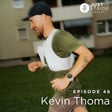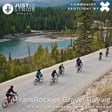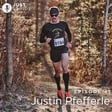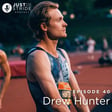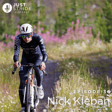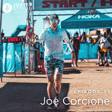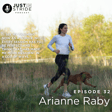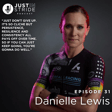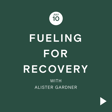Podcast Introduction & Purpose
00:00:03
Speaker
Hello, and welcome to the Justin's Drive podcast. I'm your host, Justin Puyese. If you love endurance sports, you've definitely come to the right place. On this show, we'll talk to athletes, coaches, and professionals who can help us reach our true potential. Being a student of distance running for over 10 years and interviewing people in the sport for the last five, I've learned a ton, but there's always more to discover.
Join the Journey & Sponsorship
00:00:27
Speaker
Everyone has a story, and I know you'll resonate with each of our guests as we embark on this new journey together.
00:00:34
Speaker
Join us at home, on the road, or while you run. Together we'll have some fun. So follow along on Instagram at Just In Stride Pod and your favorite podcast platform and prepare to be inspired. Come along for the ride with Just In Stride.
00:00:51
Speaker
This episode is presented by our friends at Exact Nutrition, a tasty and healthy way for you to fuel your body before, during, and after a solid training session. I can't leave the house without a few fruit bars in my pocket and they never make it back home. Exact is offering you 50% off your order when you use the code justinstride. So head to exactnutrition.com and fuel your goals today.
00:01:14
Speaker
An endurance sports success doesn't come quickly. It's preparation over many days, weeks, months, and years that usually yield the most success. It's consistency over time that allows the body to move, adapt, and recover that will provide us with the longevity in the sport. Endurance sports is a lifestyle for many, so being able to do it through all stages of life becomes the big picture goal.
Introducing Jen Sager
00:01:37
Speaker
On this episode of Just in Stride, we dive into the unknown with endurance athlete
00:01:42
Speaker
adventure racer and ultra coach Jen Sager. 20 years ago Jen set out to be the best adventure racer she could as she trained while exploring the beautiful province of British Columbia. Over that time she completed numerous ultra trail events, multi-day expeditions and team adventure races too.
00:02:02
Speaker
almost always finishing on the podium or close to it. Today, she still competes with more passion than ever, as she continues to challenge herself and her athletes as they reach for new heights.
Adventure Racing Dynamics
00:02:16
Speaker
Jen, welcome to the Justin Strive podcast. I appreciate you coming on. Hey, thanks for having me. Great to be here. Still a bit challenging with the time change, I guess.
00:02:27
Speaker
It is, it was a very quick trip to Croatia to do a race and get back home and back into the swing of life and all the things. So yes, I am a little sleep deprived, but pushing forward as endurance athletes do.
00:02:43
Speaker
Yeah. And then, you know, planning this out, this conversation, you were very excited about that trip to Croatia. And I did a little digging and this is a big time, you know, adventure race and multi-day and in a team. And I've, I've only heard stories of such races and, you know, I'm, I'm an endurance athlete myself and we speak, you know, to runner cyclists and triathletes, but I think you might be a first adventure racer that we've had on the show. You want to, since, since we're there, do you want to dig into it a little bit?
00:03:14
Speaker
Yeah, you know, it's not a very well-known sport. And in fact, those of us who are doing it is quite niche. And so you find you actually know the majority or you get to know the majority of people doing it. But essentially, adventure racing can come in very different formats. It can be sprint racing. So one day races, sometimes we race through the night. So we start to get into that multi-day. And then what I was doing was an expedition race. So those are typically races anywhere from 500 to 900 kilometers.
00:03:44
Speaker
non-stop and we mountain bike trail run paddle flip-flopping through the various disciplines usually multiple times and it's all with map and compass so the course gets revealed right before the race starts so we do some plotting we do some looking at maps this last race I just did had 30 plus maps I believe
00:04:07
Speaker
And away we set out in a team. And on the team format, you typically have to have one member of the opposite sex. So I was racing in a three male, one female format.
Team Dynamics & Challenges
00:04:19
Speaker
And together, the four of us have to get ourselves from A to Z through the course within the time allotment is sort of how adventure racing works.
00:04:28
Speaker
That's crazy. I mean, that's, it's nuts. And so do you, how did this team get made up? You know, do you live in the same area or are you from different places? Like, how do you even, you know, like, do you play off different strengths that each one of you have?
00:04:44
Speaker
Yeah, very different for me personally, for all my races. This was a newly formed team, although I had raced with two of the three guys previously, so knew them well and or raced against. Our sport is quite interesting because there is a lot of mixing and matching and whatnot going on.
00:05:01
Speaker
You know, I spent the early part of my race career for 10 plus years racing for an American team. We were very tight, great friends, grew up in the sport together. And then sort of for the last 10 years, I have jumped around a little bit. You know, often when, you know, a team needs a strong female, I might get called upon. And if the race interests me, and I think the combo is great, and there'll be good team dynamics, and I usually jump at the opportunity. So yeah, but you know, it's
00:05:29
Speaker
It's, you've got to make sure really to be successful out there that you're enjoying the people that you are racing with because it's a very intimate environment. You are, you know, within a hundred meters of each other at all times. And so you want to make sure you've got a really good dynamic.
00:05:44
Speaker
Yeah, I mean I can only imagine and so it sounds like there's some some trading going on which you know you see in major sports and stuff to kind of get to the Holy Grail. So you know and then this kind of event you have to bring all your stuff with you. I can imagine right? Nothing is provided I would assume. Yeah, I mean the majority of gear you bring so flying with your mountain bike in a bike box and
00:06:12
Speaker
all your gear for trekking and backpacks, a lot of your food. This particular race did provide kayaks, so we had multiple kayaking legs, I think it was five in total. So that's great, you don't have to fly with that, but a lot of times too, we see pack rafting and now we travel with our pack rafts, which has been a great new addition to our sport.
00:06:32
Speaker
Um, but yeah, it's a lot of gears, a lot of gear management. It's, um, especially when you have to move four people through, you know, that's a lot of things that can go wrong. That's bikes that could break or, you know, flats. We had, we had a couple of flat tires in this race. And, um, so it just, it just adds to, um, I guess the excitement and the challenge of what adventure racing is. Yeah. And so how did this one go in comparison to other ones that you've been part of?
00:06:58
Speaker
Well, you know, Croatia, this race had been on my radar for quite some time. And typically May, it's usually May, and May is a really tough time for me to get away. You know, I'm a mom and I used to put on a race as well. So I was race directing and as well as guiding. And so May, the spring was just really tricky, but I really wanted to see Croatia. So I had to hold that space for quite some time to make sure I could get to this race this year. And yeah, it was,
00:07:27
Speaker
It was fantastic. You know, I've always picked my races based on locations that I want to visit, you know, especially after I've been racing for 20 years. And so it's really important to me that I'm inspired by the terrain. And that's a big sort of way and how I decide what my race calendar is going to be for the year. So Croatia was up there and it did not disappoint. We really had great weather. We had low winds.
00:07:54
Speaker
uh, compared to last year, which I think the entire race took place like in, I don't think it stopped raining for like 50 plus hours. So we got so lucky this year. I mean, I was prepared for anything, but we've really had great race conditions. Um, and that just really showed the beauty of the country. And any surprises, like having that much race experience, uh, with these type of, you know, and participating in these ones before, like, was there anything that surprised you?
Navigational Challenges & Teamwork
00:08:25
Speaker
Well, not as far as the race went. It's sort of like the course design. We had our own problems out there, as you do. And the big one being on this one that on leg eight, I think it was 16 different legs in total. And on leg eight, it was a big mountain bike leg, 100 and something kilometers. And we lost a map that would tell us how to get to the last checkpoint and the transition area for that leg.
00:08:52
Speaker
So that was a major setback for us. We were right up competing for sort of fourth, fifth spot. And this map fiasco happened and we ended up stuck up at a mountain. We'll call it a gazebo. It wasn't really covered too well, but with a picnic table. And we ended up waiting up there for over seven hours for the team who was behind us to catch up so we could have a look at their map.
00:09:16
Speaker
and take a photo because we're allowed to carry a camera but not a phone. So to have a look at their map, take a photo and then know how to navigate ourselves to the transition area. So that took us right out of the race, pretty much, out of being highly competitive.
00:09:34
Speaker
Um, you know, it was, uh, yeah, it was a challenge, but honestly with the experience of this team, we just, we didn't want to drop out. We didn't want to DNF. And so we were like, well, this is the best case we have is if this team will share their map and let us have a look. And then we just get back going and we finish as strong as we can. And so, so that's what we did. So how likely is that that teams, you know, give up that information when they know that you have you at a disadvantage?
00:10:03
Speaker
I don't think it would be happening if we were in the top one to three positions.
00:10:11
Speaker
There's a lot of, that's what makes a sport really interesting is there is some great sportsmanship out there. We've been in positions before where we have shared bike parts with teams. You know, we've also lost a map years ago in Belize and a race and another team shared. So I feel like a lot of times you do, you help each other out.
00:10:33
Speaker
even if it is your competition. And it's kind of in the nature of this very unique sport. Yes, had it been the difference of competing for first or second and a spot at the World Championships, you're probably not going to give it up. But in this case, you know, we were moving much faster than that team. They knew it. They really didn't hesitate to help us out. And how long are these? How long is this course? And, you know, how
00:11:03
Speaker
How does positioning work? You know, does it generally, you kind of find your spot and you stay in that range or does it depend on terrain or does it depend on, like I'm sure so many things can go wrong in this type of event. So like, do places change very quickly or very often?
00:11:27
Speaker
Yeah, places change a lot, I would say, for the first one or two days, right? Our teams are pretty tight, especially, you know, we go off the line pretty hard, and there's a lot of just movements because the pace is really fast. And, you know, pretty high pressured for the first, yeah, one plus days, and then the pace backs off a little bit. And then it can come down to navigation errors, mechanicals, sleep strategy.
00:11:50
Speaker
So yeah, I would say the positioning changes less as the race goes on, but it all depends who's in your vicinity, who you're battling with, and you make decisions based on that. I mean, teams have various strengths. Some are great mountain bike teams. Other are going to be great paddling teams. So you really try to capitalize maybe on what the strength of your team is.
00:12:12
Speaker
Mm hmm. And how do you guys stay together as a team? Because, you know, strengths like you were mentioning within teams or like you mentioned as a team, but certainly within the team, their strengths also.
00:12:23
Speaker
There absolutely is. I mean, the rule in the sport is you have to be within 100 meters of each other at all times. So you are only as fast as your slowest person. That old thing, right? But it's true in the sport. So therefore you are going to do as a team to move, you're going to do whatever you can to help your teammates out to move faster. So whether that is carrying, you know, who's ever feeling stronger, carrying more gear, you can put somebody on tow. Sometimes we tow on the bike or on the foot of somebody struggling.
00:12:52
Speaker
We try to balance out our kayaking so that we're as close to being equal as possible. We do drafting. It's whatever strategies we can implement that just going to make us move more efficient as a team. Right. Yeah. Because you've got to move as a unit rather than as the individuals, right? So you've got to position people in places where they can succeed and feel good and they're contributing, right?
00:13:18
Speaker
That's exactly it. And I think too, making sure your teammates are on top of their fuel and their hydration as well is really important. There's no point letting somebody get so far behind that they can't catch up and they put themselves into a big hole, right? So it's really about team care and that has to start right from the beginning. And the most successful teams do it very well. You can't be thinking self or what do I need as a solo out there?
00:13:45
Speaker
everything is related to team, right? You come into a transition area. It's like, who needs help? Let me go fill everybody's water systems up. You know, you just everything is team focused. And does it happen in these or have you experienced where
00:14:02
Speaker
someone's not able to continue like, or in a really rough spot in comparison to the other team members. And, you know, cause like you said, it's not, not necessarily like you can keep an eye on people and make sure they have what they need and all this stuff. At the end of the day, you're responsible for your own, your own system. Right. So what do you do? And someone's like, I can't, or, you know, like, cause then there's also not just fueling, but just mentally, are they there? You know, like.
00:14:32
Speaker
Absolutely. And if it happens, right, I mean, teammates do drop out, it happens, and then that team will become unranked. So you in order to win or to place the highest, you have to finish with all four team members. Yeah, so when people are there, they're going into roller coaster, right? Multiple days, sleep deprived, high stress, things go wrong. And it's all about, you know, do your teammates help pick you up? Is it just a rough spot? You just need a little bit of extra help?
00:15:00
Speaker
Do you need a sleep? Is a 20 minute break going to lift your spirits again? I mean, there's so many, so many factors.
Motivations & Goals in Racing
00:15:08
Speaker
And is there someone that's designated like leader? Would you say every team probably functions a bit different? You know, we, uh, you always have a team captain, but, um, you know, I find that the level that I race at and with the experienced racers that I'm with, um, you know, we,
00:15:26
Speaker
Our team dynamics are so good that we can easily make those decisions very quickly together. Everybody's on the same page. I would think, though, that in some developing teams who are just gaining experience, there can be a lot of, yeah, that can be a big problem, I would say, as they all just learn their roles and their groove together and what's a good decision, what's for the benefit of the team. It's all learning.
00:15:56
Speaker
You know, which is what makes it also exciting for new racers coming in. You know, they get to, they get to go through all the ups and downs. Yeah. And make all the mistakes. Right. Unless they're in a veteran team or something. So I was going to ask you that, you know, what, what's the goal of every team is, is do some teams come in and just like, yeah, we want to try this or.
00:16:17
Speaker
Does everyone want to rank to go to a championship? Is it like, you know, cause I saw there's like 20 teams or so. Do I have that right? I was looking at that. Close to 30 in Croatia. Yeah. So like, what's the finishing percentage you were mentioning? Like, you know, do you guys drop out or not? If you're not in contention, like, so.
00:16:40
Speaker
like, you know, that's kind of a all in one kind of question, but you know, what's the motivation for most teams? Would you say, and, and the motivation to continue, even if you're not in contention.
00:16:50
Speaker
Yeah, there's lots of diversity in terms of why people race and what that looks like. There's only, I'd say, a handful of teams really gunning for a top podium spot. You know, that's just the reality. A lot of teams are out there purely just to finish. And that's awesome too. And so yeah, you do get a really, really good mix of why people do the sport.
00:17:15
Speaker
Um, once a year we have the venture racing world championships and that's where, um, your top few placements from all the different qualifier races around the world automatically show up. So it's very stacked at world championships. You've got the winners of all the races. So you have this highly competitive field. Um, and then you still have other people who are coming just to experience at the back, but typically in those races, I think there's up to about a hundred teams. So it's a lot of people. Um.
00:17:42
Speaker
you know and people set their own goals amongst that a lot of people just maybe the goal is top 20 or the goal is yeah to finish with all 14 members having collected all the checkpoints or you know it can really it can really vary oh we said all team members collecting all checkpoints what does that mean yeah so how a lot of the races work now is um
00:18:05
Speaker
There's various types of checkpoints that we're trying to that we've got to visit during the whole race. They're called mandatory checkpoints and some are optional as well.
00:18:17
Speaker
A team who's going to win has to clear the entire course getting all mandatory, all optional. They can't leave anything behind. Other teams might look at the course and be like, wow, that's really full on. We're going to skip the optional. We're only going to go from mandatory. And then they would have be sort of looking to get a ranking that is sort of first team, but below everybody who collected everything. You know, so that's just because they may look at the course and be like, there's no way we can get that.
00:18:46
Speaker
75 kilometer trek done and collect all those checkpoints, but we could get, you know, maybe the getting only the mandatory checkpoints is a 40 kilometer trek. So they still get the experience of the leg, but they are going to rank below everybody, the teams who got everything. And is there like a cutoff time? I would assume there is one. And what would you say is that the culture like for this type of racing? Oh, it's it's amazing. You would think
00:19:12
Speaker
think everybody's best friends out there, you know, it's, it's, it's so neat. I mean, a lot of these people I have raced against for years, I only see them up, you know, once every couple years, depending what race they do, what race I do, very friendly, you know, the pre race is really fun, especially the post race, you're out there then having beers and going for dinner with
00:19:35
Speaker
with the people you just competed against, even amongst us top teams and sharing and all the laughs and mishaps and everything. So it's great. The volunteers give so much. I mean, they can be stuck out at a checkpoint for like two days while that transition area or that checkpoint is open.
00:19:55
Speaker
There are check points, there are closures and time cutoffs just to keep the race moving forward. And the more the race stands out, the harder it is for a race director to make decisions or deal with emergencies. So you have to kind of keep the race forward progressing to some degree. Yeah. And is there such thing as like, I don't know, I don't know why I'm thinking of escape rooms, but like, do you have like a give me a hint option?
00:20:23
Speaker
Well there is for the checkpoints there's usually but it's it's pretty like it could just be like um you know like a ruin or castle or uh like it could just be it's just like a little extra hint as to like but you've got to be in the right area or you're not gonna fly because you might miss it you know because i guess it's like yeah sometimes it could be pretty tricky maybe to find it or you know it's just under your nose
00:20:51
Speaker
Yet you're looking at the maps and the top teams have really good navigators and people who spend a lot of time doing ocourses, orienteering and things throughout the year. And yeah, you have to be the more accurate you can be, obviously the faster you're going to go. And I know in my early years, right? Yeah.
00:21:10
Speaker
you make those mistakes and next thing you navigate up the wrong mountain and like back down you go and you got to fix your mistake. And so there's a lot going on that. That's the whole thing. It's not just who can bike, run and paddle the fastest, right? Yeah. This nav navigation, especially in a sleep deprived state is very tricky. And I would think like military people would be amazing in this kind of, uh,
00:21:36
Speaker
this type of event. Yes. Yeah. There are some military teams who come out or who are on various teams or whatnot to, you know, um, yeah, in certain parts of the world, orienteering is really big and it's not huge in Canada here, but it's really big in like Australia and New Zealand and some other places. So you get a lot of top navigators who come and join the sport and are on a top team because that's just like their specialty, right?
Jen's Journey into Adventure Racing
00:22:02
Speaker
So I want to dig into you a little bit more and kind of get a backstory to who you are. And, you know, we just talked about your race and I think that's really exciting, but just kind of get a bit more understanding of who you are, where you come from and kind of how you got here. So maybe you just start like where you grew up and you were athletic as a kid.
00:22:23
Speaker
Yeah I grew up on Vancouver Island and my main sport was playing field hockey so I was trying out for the national level field hockey team and this all sort of happened right through
00:22:34
Speaker
graduation, grade 12. And you know, at that time, it was my life, I lived and breathed it. But there was something in my gut just telling me that this chapter was coming to an end. And I was also having some knee problems. So a lot of sprinting on the field hockey pitch. And I just had to really step back. I mean, I remember it being one of the biggest decisions in my life, like major pivotal turning points where I decided to step away from that sport.
00:23:00
Speaker
And I chose a college that didn't have traditional field hockey to play anymore. Instead, it kind of got me into all the outdoor adventure type sport. So I was doing that, working towards a degree, and I ended up finishing my last year of education in Australia. I was looking for a year abroad, just something to spice it up and get away.
00:23:23
Speaker
and travel. And one night in my dorm room in Australia, right near graduation, I came across Eco Challenge on TV. And so that's something most a lot of people can kind of relate to. We did just have an Eco Challenge adventure race after being gone for 18 years. We were in Fiji a few years ago. But I've never seen Eco Challenge on TV and I watched some of these top females and I just said,
00:23:47
Speaker
That's the sport. That's what I want to do. And when I'm done with this, with my travels and finishing up school, I'm moving home to the big mountains of Squamish and Whistler, BC, and I'm going to work hard to becoming one of the top females in the sport. And it was just like, there was zero doubts in my mind. And so that is exactly what happened. I finished up and
00:24:11
Speaker
I moved back and I was probably about 20 ish, give or take here at this time, moved to Whistler and just submerged myself into the sport, learning everything that I could.
00:24:24
Speaker
Essentially at that point, I was just living out of a bag racing teams were asking me to race for them. And I realized quickly, it was my ticket to travel the world as well. And I just got so much experience in the sport and I got it really quick and, um, just being highly competitive as well. You know, there was, um, it just, I just wanted to push myself, be the best, um, race hard. And so that's what I did. And, uh, things just took off from there.
00:24:54
Speaker
Yeah, would you say that you always had that kind of attitude inside of you, that character? Was there a mentor or someone that kind of gave you that confidence to take on a new challenge and rise to the top of it? I think it was very self-driven. I mean, I love to compete. I just love competition. I just find it can bring out just the best in ourselves. It takes us to a place that
00:25:23
Speaker
It's hard to go alone sometimes right when you're you know people and
00:25:29
Speaker
I just find when I'm passionate about something, it just takes over. So my early years were very just self-driven and it was all encompassing. I find with doing these adventure sports, whether it's the venture racing or my love for mountain running or whatnot, it's a lifestyle for me. So it's not anybody ever twisting my arm like, oh, you need to go for a run today. It's just like,
00:25:54
Speaker
Yeah, it's more like, okay, you don't need to go for a run all day long. Like, you know, you got to kind of find that, that balance. Um, and so any spare time for me is just spent outside. I mean, this is where my happy places is where I love to be. Were you also working towards, uh, a career for yourself also and being an athlete?
00:26:18
Speaker
Yeah, you know, when I lived in Whistler, I mean, I kind of felt when I moved there too, I was like, well, everybody should do a mountain town once in their life. And so I was like, okay, I'm going to give myself two years. I ended up staying in Whistler for five. And then I moved down to Squamish and ended up there for another 15 years. So yeah, you know, I started out with what was a degree in Recreation and Tourism Management.
00:26:40
Speaker
But within a couple years of racing, I started to find that people were really reaching out to me and asking how could they get involved? How could they train? How do I prepare for these sort of events? And so the coaching world sort of found me. I didn't know it was going to become a full-time career. And it has, you know, over the last 18 plus years. That's what I've been doing is I'm a full-time coach and I coach in the endurance realm and
00:27:10
Speaker
And yeah, so that just sort of then led to more studies, more learning paired to experience and opening up that whole door. So the two really mold very well together, being a racer, but also understanding how to prepare. And I love it because it's evolving. The more science we know, the more data coming out, the more research
00:27:33
Speaker
that shifted how I coach as well. And I can really help now guide people away from some of the mistakes that I made in my early years when there wasn't all that knowledge out
Challenges in Adventure Racing
00:27:43
Speaker
there. And now it looks quite different in my coaching career and what I do to help other people. And would you say like it was, was it easy for you to enter? Was it a barrier to entry?
00:27:55
Speaker
low for at that time and maybe maybe speak to how the sport has evolved. You mentioned how the science has changed.
00:28:05
Speaker
Well, you know, initially, I'd say the more so the barrier to doing some of the bigger sport, like the adventure racing, because it's so gear intensive. So it is still to this day, one thing that keeps people away is because it's expensive. Like, you've got to have, you know, there's just so much gear involved. It is a little different than just grabbing your running shoes and away you go. And so you start to look at, yeah, a mountain bike that's constantly breaking because you're riding it so hard and
00:28:31
Speaker
You know, all those sorts of things. I got very, you know, very fortunate to have a lot of support when I was young and I got picked up by sponsors. And, you know, so a lot of a lot of stuff was paid for and all my travels and and whatnot. So I got very lucky in that. But I'm fully aware that the barrier to entry is a lot more is quite challenging. And I think now, especially in today's
00:28:57
Speaker
you know, world sponsorship dollars and, um, funding and all that is, it's just, it's getting harder for companies to do that. So even in like, uh, you like, cause I view it, the adventure racing, maybe I'm wrong as like more of a niche, uh, sport in comparison to other things like, you know, running is huge right now and triathlon and, you know, so, um, so you're saying even in like a niche market like that, the dollars are hard to come by.
00:29:25
Speaker
Yeah, they seem to be a lot harder now to come by. Back when I was in my 20s and racing hard, there was some awesome sponsorship at the time that really allowed us to travel and make some good money. There was a lot of prize money. I spent a lot of time racing all through the US as well, hardly ever unpacking my suitcase. I just kind of was on the road. Yeah, racing and to win that prize money was huge.
00:29:55
Speaker
trying to make it in Whistler, um, couple jobs as well as, as winning prize money. Like it was, it was a tough go, but it, it felt like the right thing to do. And I didn't have all the responsibility when I was younger. So I guess the timing was right. And was there good money in it too? Like for good prize money for those races? Yeah, there was. Um, and I think we've seen that, you know, ebb and flow through the years, depending on, you know, now when a race does put up some good cash.
00:30:22
Speaker
definitely the top teams are coming to get that. But yeah, you know, there was money and there was also money in the ultra running scene. And as you sort of do your best to get what you can of it. Yeah. And what were some like early lessons that you learned as you entered into this kind of new sport? Well, I think there was a lot of things probably going on for me at that time.
00:30:54
Speaker
you know, where to put my time in terms of training versus working like just making sure like, you know, I had something to come fall back on, you know, that I wasn't just blowing all my money on the sport. You know,
00:31:12
Speaker
my health also took a pretty good beating for a while too, like just racing so much without very little downtime. And so there was a lot of lessons I'd say I had to learn the hard way. And it can be tough, you know, when you're racing for a sponsor, you don't want to let anybody down. And so you push through injuries and you don't say no to opportunity and all that kind of thing. And
00:31:37
Speaker
I guess I always just kept thinking, oh, it'll be okay. I'll recover at some point. But then when you realize is that you can actually race around the world year round. And so there doesn't have to be necessarily an off season. And so it was, it was just a lot of racing and a lot of figuring it out on my own, I guess. So it kind of like overused through racing itself and
00:32:04
Speaker
You know, they say, a lot of people say like, Oh, listen to your body. Like use these, these kinds of cliches. But like, what did you, when you realized that you were maybe working yourself too hard, were there changes that you made or have made over the years so that you can endure for longer? Yeah, exactly. You know, my goal is to have longevity. I mean, this is still what I love to do.
00:32:29
Speaker
And I want to be doing this for another 20, 30, 40 years, right? Like you picture yourself being that person who's still out there and getting it done. But that's only going to come with being really smart and taking care in the
Managing Stress & Nutrition
00:32:42
Speaker
moment. So, you know, I give myself so much more downtime, I would say now. I do a lot to remove
00:32:51
Speaker
stress, you know, because the body doesn't know training stress from work stress from relationship stress to travel stress, it just sees it as stress. And so that has been a lot to for me to focus on to keep my hormones in a really good spot. And so that's, that's a big focus of mine. My nutrition is another really big piece. I've learned so much over the years about that. And, you know, making sure that I'm, you know,
00:33:19
Speaker
eating enough that I'm not being under-fueled, you know, giving way more attention to the quality of food, the frequency and whatnot. So those are probably some of the big things that I have really honed in on. Now, did you learn these things on your own or do you seek professional advice for those other things, you know, like nutrition and, you know, recovery and all these other things too?
00:33:46
Speaker
it's been a big mix. It's been a lot of trial and error, as well as trying to seek out like who, like where to go for help. And I think that's always been a little bit of a, you know, a problem is you can sort of see there's something going on, and you don't know who to go to get help from, right. And you have to really be an advocate for your your own health. I'm doing a lot of research at talking to a lot of people getting answers that maybe I also didn't agree with, I don't feel like
00:34:14
Speaker
They understood the severity of the problem. So you have to always keep digging. And, um, I think now, like, you know, I've identified just so many, um, good professionals, um, that I can work with, that I can send athletes to work with, or I can recommend to, you know, athletes or friends or whatnot. Um, I just think, yeah, things are growing, improving, um, and, uh,
00:34:40
Speaker
you know, for me, just being a lifelong learner, but also wanting, yeah, like I said earlier to be able to help prevent other people from going through some of the challenges that I had to go to, you know, I mean, it seems like endurance is so much more mainstream and, you know, we're really learning a lot, but that just wasn't the case. I mean, back when there was like, nobody coaching in the endurance space, like to find an adventure racing coach was, was very hard, right? It didn't really exist. So,
00:35:08
Speaker
I think it's exciting and that we do have more to work with now. Yeah. And, you know, like you have like so much experience now and I'm sure speaking to athletes over the years, it kind of brings back.
00:35:21
Speaker
you know, memories of things that you went through or challenges you had and how you got through them. And sometimes when you've raced for that long, you know, you don't always remember those little things, but maybe something someone says, bring those things back. You know, what would you say, what's the best advice you can give to somebody just getting into the sport so that they can maybe have a 20 year long career like yours? You know, I think the biggest thing is like, don't be in a rush.
00:35:51
Speaker
You know, like, don't feel like you have to do every race, everything that comes your way in one season. Like, you know, space things out, enjoy the process, build, you know, find a schedule, find a race calendar that works for you, that's like progressive. Just don't feel like you have to tackle everything in the first two years.
00:36:17
Speaker
I think it can just be a lot. The one thing I know with the athletes that I coach, and especially my adventure racers, is I demand an off-season. I know what this sport entails, and if you're doing this expedition-length racing, when we go and do these massive five, 700-kilometer races, you can only do so many in a year. So when people come to me with this full schedule that they want to take on, you're just like, okay, maybe let's look at this from another way.
00:36:42
Speaker
A lot of these races aren't going anywhere. We can spread these out. We can give ourselves proper build time, recovery time, and still hold space for the other things in life that you enjoy. I don't necessarily want to use the word balance because I don't know. It's kind of an overused word that doesn't always work when it comes to scheduling and how we live.
00:37:08
Speaker
You know, you can find ways to really enjoy the process and keep growing and learning and yeah, and think sort of the big picture plan.
00:37:20
Speaker
Yeah, and I saw like, I went through your, your list, you know, of, of races. I mean, you have so many races and so many ones and twos in there. Um, it's quite impressive resume, but you raised a lot in BC, uh, especially early on. And I think that's, I mean, I think that's really interesting because I feel like, uh, a lot of time we, we want to get away from home and race over here and race over there. But like, you know, there's so many events close by that we can.
00:37:49
Speaker
You know, you don't have to fork up the money for travel, get your, your like, and then not just adventure racing, but you know, triathlon or even running, you know, you don't have to get a flight. You can just do the stuff close to you. And I think that's, it's also supporting your own community too.
00:38:06
Speaker
Absolutely. I mean, you live in some of these meccas, there's so much to do and you can gain so much experience and not everything has to be like an A race. It can just be that you sign up for an event, you support that event and you go and you get experience at it. And it can be, like I say to my athletes, they're so great for
00:38:27
Speaker
Testing out your nutrition and your hydration and pushing yourself and and don't be afraid if you push it too far and it doesn't end up working out, you know, but thought you find where that line is and you.
00:38:38
Speaker
And you learn from it. And so we don't have to think that every time we stand on the start line, it's got to be like the A race. Our whole life depends on it or everything, you know, doesn't have to be like that at all. And I think there's so many race directors out there now, like trying to provide an experience. You know, I mean, look, you could look every weekend and there is something going on and some cool event to do.
00:39:02
Speaker
so why not take advantage of that if it means less travel and then work up towards the ones those big big ticket races or whatever it is that you want to do but you know get to those when you're ready when it really makes sense for you you know so i see a lot of times too with folks they're
00:39:19
Speaker
They're pushing to make something work, but you can see there's resistance from their family and their work, and they're just trying so hard to like, I've got to do this right now. But you want to make sure that your entire environment around you is supportive of going to that, that bigger event, right? It's a lot. Well, I mean, a lot of, I mean, my family thinks like triathlon's crazy, so I can only imagine what they would think of. Like, how long you, like, and it's just a day. How long are you racing for?
00:39:49
Speaker
you wake up, I'm swimming, then you're having lunch, I'm biking and then, you know, getting ready for dinner and I'm running. But yeah, that's a big thing too. And not everyone's going to understand, but at least if you get people really close to you, around you, support you, then that really matters because, you know, a lot of resources, energy goes into planning and preparing and
00:40:15
Speaker
And to do these these types of expeditions or adventures. Now, like, is there different levels? I was going to ask you, can you just do like a run bike
Activities & Training in Racing
00:40:24
Speaker
one? Like I know in triathlon you could do a duathlon, for example. So is there ones with like less in terms of the types of like you don't have to get in a boat for this one or you don't have to?
00:40:37
Speaker
Yeah, I think there is. I mean, for the most part, you would see in the shorter races, there could be lots of variance as to what that race might entail. You know, yeah. And it's just like early season races sometimes in the sprint scene don't have paddling because the lakes and rivers are frozen or whatnot. So there is a lot to choose from. But when you go on to sort of the bigger expedition length, you're always going to have, you know, some form of the main
00:41:04
Speaker
modalities in there, although it can, it can really vary. Like the paddling could be canoe to kayak, to pack rafting, to whitewater rafting. Like it gets such a, there's so much variance as to what's offered. Yeah. And are you always able to practice all these, all the activities at these races? Like whitewater rafting, like how often are you going to go whitewater rafting, for example?
00:41:33
Speaker
Yeah, well, if you know it's going to show up in a race, then, you know, you would put your best effort forward to go get some of that training locally before you actually go to a race. So we always know, yeah, the main elements at that race location of what we're going to be doing. And then you work towards that, you know. And so my expectation is on the teams I race for is that we've all gone and got
00:41:56
Speaker
brushed up on our skill set, gotten that experience. And then sometimes you'll see if there's somebody on your team who has that extra bit of experience in that area, they tend to take the lead. So if we do see whitewater, while one of my American teams, our captain is also comes from a whitewater rafting background. So then he'll probably be the one steering the boat and making the calls.
00:42:21
Speaker
Yeah, the expectation for me is that we've all gone and gotten that further training that that extra experience so that we're smooth when it comes to that section. And are you guys following a similar training plan? Like, do you have a team training plan? Or are you like all just everyone's responsible for their own
00:42:39
Speaker
Yeah, very different for every team. I mean, on the team diaries for everybody shows up, having done their own training, you know, they might reach out to me if they've got questions or whatever, because I'm always happy to help my teammates out with with, you know, being prepared. But when it comes to other teams, you know, I see it all I see I might coach one or two of the four people on a team or sometimes I will team coach so that everybody's on the same page. It's just fuller. Yeah, what people are looking for what they
00:43:07
Speaker
what they need or their areas of weakness or if they're just trying to elevate their game. You get everything from the person who's just like, okay, I want to complete my first race. I don't even know where to start. This is so overwhelming. The race has been at it for six, seven years and they're like, I want to go hard and fast now. I got a good team and we are going to go for it. So I see everything.
00:43:30
Speaker
Is it is it easy or difficult to be relatable to every athlete that you coach? Because you have such a resume and.
00:43:38
Speaker
can be, you know, it's quite impressive for somebody who, you know, maybe just starting or as much less experienced than you are. Like I know when I met my mentors and, you know, how I got into triathlon, like I was mentioning to you before we got recording, you know, I was a big fan. I was just, you know, I was going out and training with them when they were training for crazy stuff and I was just getting fit, you know, cause they would let me tag along, you know, but I was, I asked questions cause I was just like so fascinated, you know, but I always wonder that
00:44:08
Speaker
you know, when you're kind of a high profile, or maybe I don't know, I don't know if you even consider yourself that way. You know, I, I just try to be relatable to whoever. I mean, I love what I'm doing. I'm very passionate about it. And I love seeing people take on challenges. And you know, and I, I don't put someone training for their first 10 K, any hire above someone who's decided to take on an expedition adventure race. To me, it's the fact that you set a goal.
00:44:38
Speaker
And I'm going to be with you to help you get there. And I think there's some qualities about, you know, or just me that work for some people. One, I'm a mom as well. So if they're coming from a family background, like I get, there's demands of, you know, your family and your priorities. And so I try to help always have that training fit and meet the person where they're at. Right. And so
00:45:03
Speaker
you know I work with the time constraints people give me if this is if this is what they can train okay well let's make the most out of that if there's not you know five extra hours in a week well they don't have that I'm not going to program that it's like they come to the table of what they can do and I'm going to try to make that work
00:45:19
Speaker
for them, you know. But I also I remember what it's like to be back learning the sport and stepping into it. And, you know, anything even from, like I said, the running, like, I know what it's like when you just start to kind of gradually go up in distance and trying things. And so I just try to reflect back on that from what how that felt, all those excite those feelings, the overwhelming everything. And then I just try to apply that to the athlete that I'm I'm working with. So.
00:45:48
Speaker
Yeah, I mean, I think that human aspect is always appreciated. And, you know, in having a connection to that's like relatable, you know, you're an everyday person with your own family, your own kid too. And, and I think that's like relatable for a lot of folks, any tips for the moms out there that they want to, they want to be world beaters to and, and, you know, be the athlete they were before kids.
00:46:14
Speaker
Yeah, I love it. I actually love it when I see it, because you get that on their intake form, you know, well, I used to do or I was, and this is why I like TV, you know, it's so awesome when they want to step back in and see what they're made of now. And I think as long as you know, they've got their the family support, and we find a good schedule that really works for them.
00:46:34
Speaker
They surprise themselves with what they can still do. And so I really find it comes down to scheduling. And I do try to stress the importance of holding space for oneself.
00:46:50
Speaker
You know, to get like your personal time, you know, for me still to this day, right? I look at my training that I need to get done and it's an appointment with myself. It's a non-negotiable. I schedule that in. That's my time. That's my window. And, um, and then I go out and I make the most of it. So I just find it really comes down to scheduling. Yeah, for sure. And yeah, it's time management too, right? Like how do you find time to do a podcast or work or train or, you know, if you want to do these things, you got to.
00:47:20
Speaker
you got to prioritize yourself. And I heard this too before someone saying, you know, when, and everyone trains at different times, but when they wake up in the morning, they get their run in. And that's, cause that's health is number one priority for ourselves, you know? And I thought that was an interesting take. I mean, there's other priorities in life, but if we don't have our health, we don't have anything, you know? So. Absolutely. Yeah. You know, I, same thing. I, how I prioritize, I mean,
00:47:48
Speaker
I, yeah, I'm a morning trainer myself too.
Balancing Goals & Responsibilities
00:47:51
Speaker
I also don't like to push things off to later day because things go over up, you know, go upside down frequently or and I go into family family mode and my kids sports and all the other things I want to be there for.
00:48:02
Speaker
But I think it's also important to realize that once you've set your goal, you realize, OK, this is a chunk of time for X number of months that you're going to work towards that. And some other things need to probably take a backseat and you're going to have to make some decisions, maybe some sacrifices, or just cut out things that aren't going to serve you or are going to distract you for X amount of time.
00:48:27
Speaker
as you work towards your goal and those things can always come back in after and that's also I think that healthy big picture of like okay yes I'm all in towards my goal I'm going hard once I achieve it boom I just back off and I switch my focus a bit and I give myself that breathing space and that way
00:48:45
Speaker
when you return to a new goal and you come back fresh and ready versus just sort of this lingering like you're like you're just on this hamster wheel that's never going to end it's like get there celebrate it enjoy like what I tell my athletes enjoy the journey when you're on your start line and you're out there doing your 200 mile run whatever it is this is your celebration like you just gave up so much you worked so hard for so many months for this like
00:49:12
Speaker
go enjoy it. Go enjoy it. You did the work. This is the, this is the party now, you know? And then when you're done, you got lots of rest and chill time and time to put back in other little things that you maybe pushed to the side. So good schedule and plan can, can make that all come together really nicely. Yeah. I love that. I love that. It was training a few athletes to go to, and they were running Boston, one of the
00:49:35
Speaker
second time when the first time and I said the exact same thing you know it's it's you're there you made it like this is this is the parade now so like no stress like you put it you know works your haze in the barn they say and you just what are you gonna do you just go and run the best you can and just like there's some good training days and bad training days there's good races and bad races I'm sure you can you can attest to that
00:50:02
Speaker
Now over your whole like racing career, like if you had to pick a highlight reel, do you think you could do that? Like your highlights of the night, you know, as we are in Canada? No, I don't think I could, if I'm being honest. It's always such a hard question. Half the time I can't even remember the things I've done until there's like a trigger.
00:50:25
Speaker
I mean, things are different. They're memorable for different reasons. I mean, whether that was some crazy struggle or a massive mishap, or it was that feeling of achieving a goal and winning something that you worked really hard towards, or maybe it was just the people that were out there with you. Maybe it was moments with a particular up hacer or your teammates or what have you.
00:50:49
Speaker
You know, all I can say is there's a lot of really cool stuff to do out there. You know, there's so much opportunity for various types of races, you know, and or personal adventure. I spent a lot of my time now even coming off this adventure race. My next few months is all mountain objectives and personal goals and things like that that I that I want to do. So I just.
00:51:11
Speaker
I just like to encourage people just to choose something that speaks to them. It's got to be your goal. It's got to be something that you're really stoked about. And if you're not, it's hard to keep that fire blazing through the tough times as you prepare. But it's really funny, too. As a coach, people come to me with, hey, I've got this idea, or I found this race, and they're pulling things out that I've never even heard of or seen.
00:51:37
Speaker
And it gets me so excited. I'm like, oh, this is awesome. And if I can, I might take them on purely just because they've chosen a really cool goal and something that's so new and refreshing and whatnot. So there's lots out there.
00:51:50
Speaker
Yeah, I know, it's crazy. I mean, like you said, it's limitless. There's so many things. And like, I'm doing a relay race here in Europe that I never heard of, you know? And, you know, we got some, you know, some friends from Canada coming over and I'm just here. So I get to be part of it in a few weeks.
00:52:08
Speaker
Yeah they're all kind. Like we did that from Canada and Europe and we're like oh my gosh that's like a lifetime of racing and it seems like there's something going on like you know five events every weekend in those mountains. Yeah no and just just here in Zurich there's races all over there's a series just here like of running races you can do through through local mountains and stuff and it's
00:52:31
Speaker
Yeah, it's, it's really nice to just get to discover where it is that you're, you're racing. Do you find that, because you said, you know, you get to travel the world and this and that, but like you are in a race environment. Do you guys get a chance, you know, you don't have your phones, uh, to, to soak in what you're actually seeing? Like, are you able to be present in that moment to appreciate what you're, you know, the beautiful nature around you that you're in a different place and, um, maybe someplace you've never seen before.
00:53:00
Speaker
Absolutely. And I find actually there was probably was a chunk of my time where I wasn't super focused on exactly where I wasn't soaking it in. But I find now because I am doing less and less racing, I'm appreciating it more and more.
00:53:16
Speaker
And so, um, it was funny. I had this conversation actually in Croatia with a teammate. I was like, you know, what do you, like, what, why do you still race? Like what's in it for you to come out and do this? We were having this conversation, you know, and when it got to me, I just said, you know, I think it's because for four days I step out of all my other roles. I'm away from all technology. Like I'm just here. I'm not making dinners. I'm not cleaning. I'm not on my device or anything. I'm just.
00:53:42
Speaker
totally in the present. And so then you sat there and you were on this beautiful blue water kayaking out and getting a checkpoint jumping into a hole. Like you're so present. You're so hyper aware of every little detail around you that it's
00:53:58
Speaker
I really do. I appreciate my time now so much more. And I appreciate that I've got my supportive family that's allowed me to go have this week away and that everything is sort of taken care of back home so I really can go and submerge myself in that experience. Yeah. And that's special. I think everybody should do a weekend without their phone or maybe
00:54:20
Speaker
phone weekends or phone free or something like the digital world has kind of taken over. And I think like that's a unique experience that you get to have. Um, that was maybe more common 20 years ago, but now it's like, it's way more oncoming. It's kind of sad. Like I told, I told my partner all the time. I'm like, I find it a bit sad, you know, when I see people like out to dinner on their phones or just like even just walking down the street on their phones. Like I just appreciate like looking around. I still like to do that, like walk around,
00:54:50
Speaker
do a hike, just look around and see the surroundings and just appreciate the life that you have and your health and why you have it. So true. Yeah. I do so many more great pulls now, like you just noticed it, like just so grateful one that, yeah, the health is there, the opportunity is there to go do this, the great people I'm sharing it with, it's just so much more gratitude.
00:55:15
Speaker
I put it all into the big picture. We did come out disappointed that we, where we finished in this last race with the map thing. But at the end of the day, who cares? It was just a race. It was one thing. And moving on, I got a beautiful experience out of it. And I'm not going to sit and dwell on it. I'm just going to pick up the pieces and start refocusing again on what's next.
00:55:40
Speaker
Did you ever race and feel like you were in danger? Were there ever any close calls, would you say?
Safety & Decision-Making in Racing
00:55:48
Speaker
Do teams get in tricky situations? You're in the wilderness, you're surrounded by nature and wildlife too.
00:55:58
Speaker
Yeah, yeah, lots of things over the years. You know, we've had grizzly bears, you know, bluff charges, super close. I've had, yeah, some really scary situations with teammates who have gone down due to heat and had to be evacuated out and we didn't know the outcome and things like that. I mean, you try to, yeah.
00:56:20
Speaker
You know, take all precautions you can, but the end of the day, you still make really, you try to make the best decisions that you can. And a lot of adventure racing is that, like there's rules and there's a container to some degree, but you know, like just in this last race, we were heading out on the last paddle across, it was the second to last leg.
00:56:41
Speaker
had been pouring rain and we had just been up on a ridge in a full lightning storm that we figured the lightning was about 3k away from us by this point and we dropped down to the water we got our kayaks ready and the lightning was like right over top of this paddle and it was only a four or five kilometer paddle across a bay to where we'd get on our mountain bikes and we do our final mountain bike to the finish
00:57:00
Speaker
And we were like, OK. And then we just sort of stepped back as a team. And we were like, would we go paddling in a lightning storm that was this close in any other time? And we were like, no. We're back. We're racing right now for holding six spot. It's not this is first or second. We all need to come home at the end of the day here. So there's always just things like that. There's just decisions you make.
00:57:26
Speaker
You know, different routes or shortcuts on a course, like would you go this way? Is that safer or through a Boulder field? Or like, you're always just trying to weigh your options in order to minimize, you know, what could go wrong. And then of course, just there are things that happen. People fall, injuries happen. You can get pretty banged up and beat up, but, uh, you know, you do, you do, you can't to minimize. Yeah, totally. I mean, you, so you gotta be reactive to it at the same time and.
00:57:53
Speaker
You can only prepare so much, but you can't prepare for the unknown and that, you know, people worry about the unknown and marathon. So I can only imagine the checklist that you guys have to go through or to kind of, you know, prepare for, you know, anything and everything, you know, and even then you're probably not prepared for everything and anything, you know.
00:58:12
Speaker
No, totally. And I think that's part of the unknown and probably the element that I actually just really love about some of these sports. I do love the freedom of it not being so regimented. And what's crazy is you finish these races and we've had this crazy experience and somebody else has had a completely opposite crazy experience around a different time and the stories after that come out are wild.
00:58:39
Speaker
So much of it is trusting in your teammate, like teammates that you, you're with good people who know how, if something goes wrong, are they going to get you out of that situation? You know, and so I put a lot of weight on that as well. Where would you say you saw your greatest improvement as an athlete? Um, I don't really know. I mean, I think through the years that's looked so different, right? From, um,
00:59:10
Speaker
probably from my younger years where I guess I found that my recovery was so much quicker and I felt so much faster and just that I could handle so much more.
00:59:22
Speaker
Um, to where I'm at now where I just know, I mean, I think I swore I was never going to age. I said I was like 23 forever. Um, but you know, now, um, I think the improvements are still there, but it comes with a lot of, um, added recovery. Um, a lot more like just checking in with myself. Um, so volume can look so different.
Nutrition & Recovery
00:59:45
Speaker
But, you know, in the same point, like nutrition has really improved and because I just know so much more. And so I'm supporting my body so much better and I'm getting so much more sleep. Like, you know, I'm I'm nine hours a night and I don't really compromise on that. Yeah, that's been a huge part of recovery back to when I was in my low 20s. I was like, oh, yeah, four or five hours. That's all I need. Like I can run on whatever. So, yeah, I can probably say that.
01:00:14
Speaker
Yeah, just running on fumes back then. I feel the same way. And now it's like, yeah, I better get my sleep. Otherwise it's, uh, it's tough on the body. So.
01:00:24
Speaker
Yeah, I mean, I think the mental mental toughness just grows with experience. I don't sweat the small stuff anymore. Like, there's things that don't worry me like, oh, yeah, like I can have a bad workout. I can have two bad workouts. It doesn't matter. You just, you know, it's not the end of the world. You you go back to the drawing board, you just realize what it probably was and work to correct it. So I think I just have such a bigger scope of big picture, you know, and and that that's really helped play to my benefit as I've aged.
01:00:53
Speaker
What do you hope to achieve from all this at the end when you're done? I don't know if you ever think you can't race anymore, but what do you hope to achieve now?
01:01:06
Speaker
It's just a lifetime of doing what I love. I mean, I can't think of anything, anything better. I mean, if it's racing or if it's family adventure or whatnot, like, like I said earlier, it's just a lifestyle. And that's all I want to do. I want to just keep, if I can keep helping other people also experience what I've gotten to experience in their own capacity to whatever that may or may not look like race wise or just personal challenge wise.
01:01:34
Speaker
Then that's all that I can really hope for. Like my son sees me doing this stuff.
01:01:43
Speaker
you know, that speaks to him in some way of just that, you know, mom and dad make these decisions to keep getting out there and challenging ourselves and not being afraid to fail, right? I wanted to see all of that. Like it's not, it's not all, it's not all winning. Things don't go perfectly all the time, but it's just our attitude and how we pick up the pieces again and get back out there and then just living a healthy life, you know, so. So is dad into this stuff too?
01:02:10
Speaker
Yeah, he's a big paddleboarder. So yeah, he's an amazing athlete, not so into the adventure racing scene. We might, you know, we do some short races together and stuff, but yeah, he's more on the expedition scene of big paddleboarding and he's a guide. He's an outdoor guide as well. So we all just, we just live and breathe it, right? Like, it was funny, a few nights ago, we were like, we just need to get away and sleep in a tent for a while. And so, you know, like,
01:02:37
Speaker
So we did we just we loaded up the boat we went boat camping for a couple days and we're on the same page like that so it's it makes it really fun. Yeah get out in nature have some fun and you know it's uh it's no that's great it's a great way you know having an active lifestyle I think is a it's a nice way to be and
01:02:58
Speaker
each day when we, we hold that space for each other, that we know the importance of it. If he's like, yeah, I need to get out and get out for a paddle or a quick run or, you know, like we just, we know the importance of what both of us need on that. So we make it happen. Yeah. Can you talk about all the, you know, I checked out your website, you have a lot of things that you offer and to the coaching and
01:03:19
Speaker
training course plan and run BC and all this stuff. If you had like, just talk to us a little bit about what you do when you're not training yourself. Yeah. So when I'm not training, I know I'm busy being a mom and whatnot, but yeah, coaching is my full-time job. And we've talked a little bit about that. I sort of a passion driven project. I'm also a mountain and running trail running guide.
01:03:48
Speaker
So I run a small business called Run BC Adventures and I try to offer a few different multi-day running trips to new locations every year. I do that purely because I love to provide an experience that gets people away from racing and standing on a start line to still taking them out into the mountains.
01:04:09
Speaker
and having some kind of experience of challenging themselves or seeing new terrain or whatever. So I've been guiding for about eight years. And so, yeah, always adding and looking for new locations.
Guiding, Coaching & Personal Pursuits
01:04:22
Speaker
And I mean, the spot, I don't offer a whole ton and the spots fill up pretty quick because the same people are just like, where are we going next year? And so I'm creating and I'm like, I can only guide so much and I can only be gone so much. So, you know, that's
01:04:38
Speaker
It's really fun and I really love that. And then the other thing people probably don't know much about what I'm doing either is I'm pursuing my private pilot's license right now as well.
01:04:49
Speaker
Yeah, and as odd as it is and as hard as it is, it's got some similarities to endurance sports. It's a rollercoaster of success and failure and the mental battle and doing scary things. So that's taking up any extra little bit of time. It's taking me a lot longer to get through it.
01:05:11
Speaker
that I want but again it's like I have to stay focused on my big vision with this and why I'm doing it and where I hope to apply it once I've got my full license. Yeah why are you doing that? Access for more adventure you know.
01:05:32
Speaker
I just I dream of like putting a couple friends in the plane and landing somewhere cool and taking off for the day on a big trail run and coming home or you know eventually my hope would be is my float plane endorsement down the road and being that we now live on Vancouver Island and I mean
01:05:51
Speaker
The, the coastal trails and, and life on the coast is just, if some, so passionate about it. So the float plane will really help open up doors, but, um, yeah, it's got all the things in it. It's got the mental capacity, the focus piece, the doing hard things. Like it's, it's really funny how much insurance training and racing and flying having confidence. Yeah. Cause like the lessons we learned through sport, we can apply it to everyday life. Right. So true.
01:06:21
Speaker
Yeah. And then actually you'd be like the second pilot that I've had on the show. Oh, no way. Yeah. First, the last guest was like, um, she's, she's a triathlete and she's also a pilot. So it's funny. It's funny you mentioned that. Um, yeah. So I guess I'll end with this. Like what's, what's the biggest thing that movement has brought to your life? Uh,
01:06:48
Speaker
probably just the ability to self-challenge, right? To just test my own limits, see what I'm made of, see what I'm capable of, overcome barriers. I think that all comes through movement. And it's funny because I just, yeah, I can't imagine really a life any other way, right?
01:07:13
Speaker
It's just a part of what I do. And it sets my day up for success. I feel like it grounds me. And yeah, I just hope it's something I'll be doing for many, many years to come.
01:07:27
Speaker
And I have to ask you actually one more thing because I saw it on your website, the impossible, the possible on your website. And I asked you about Ray before we guys started recording. So how did you get linked up with Ray? I know he's a big adventure guy and I've had him on the show also. And maybe just give us a little story there.
01:07:46
Speaker
Yeah, that was a good, great podcast with Ray. Ray and I met one of my, my first ultra running race that I took on was the marathon de sab in a Sahara cross Morocco. I don't even know that must've been 20 something 20 years ago, I think.
01:08:01
Speaker
And so, yeah, met Ray there and we were teammates and we just became instant friends. I mean, Ray and I are like family now, we joke, we're brother-sister. You know, we've had lots of adventures over the years, so many laughs. You know, I just, I love his energy, so supportive. And he's doing such great things with, you know, I2P and his foundation and
01:08:28
Speaker
spin stuff. So yeah, you know, always keen when Ray and I can get out and hit the outdoors together and do something so. You still get a chance to link up from time to time? Yeah, yeah, we've been a couple years now. You know, we've had a few things on the calendar that we've had to change and shift but, you know, raise a man of ideas and it's always, I've got an idea! You know, so yeah.
01:08:56
Speaker
Hopefully we'll be seeing each other sooner than later. His family is great and following all the successes of his kids and whatnot. Oh yeah. It's amazing. It's such a small world and I had your athlete on.
01:09:11
Speaker
You know, Ray and yeah, I love how this podcast kind of intertwines with the guests that had on and hopefully we can keep that going. So, Justin, you're doing a great job with it. And it's so true. Like it, we are all connected and in the big picture, we are a very small close-knit. I mean, it's usually about one degree of separation. Isn't that what they say? You know, somebody, but I think those of us in this space, you know, we, we all speak the same language and I think it's, it's so cool to, to connect and, uh,
01:09:40
Speaker
Yeah, draw from other people's experiences and whatnot. So really appreciate what you're doing for this community as well. Oh, I appreciate that. Yeah, and thanks for taking the time. I know you're a big jet lag coming back and we're challenged a bit with our time difference right now, but I really appreciate the time today and sharing with us everything you have and I can't wait to see what you get up to next.
01:10:04
Speaker
Well, my pleasure. Thank you. And yes, all the best as you go into the evening there. And I hope one day we hit the mountains together. Oh, yeah. Cheers. OK, thank you. Bye. Thanks for tuning in to the Just In Stride podcast. I truly appreciate you taking the time to listen, and I hope you enjoyed that conversation as much as I did. Please take a minute after this to rate and review our show on Apple Podcasts. With your feedback, we'll be able to make the show even better
01:10:33
Speaker
and it'll help us reach new listeners too. You can also find us on Instagram at Justin Stride Pod for all the latest episodes and updates.
01:10:42
Speaker
Of course, this show wouldn't be possible without a solid team behind me. With logo and design by Vanessa Pugliese, as well as audio, music, and editing by Forest McKay, a huge thank you goes out to both of them. Guest outreach, social media, writing, and advertising are handled by me, your host, Justin Pugliese. Finally, we'd like to thank you, our listeners, for coming along for the ride with Justin Strad.

